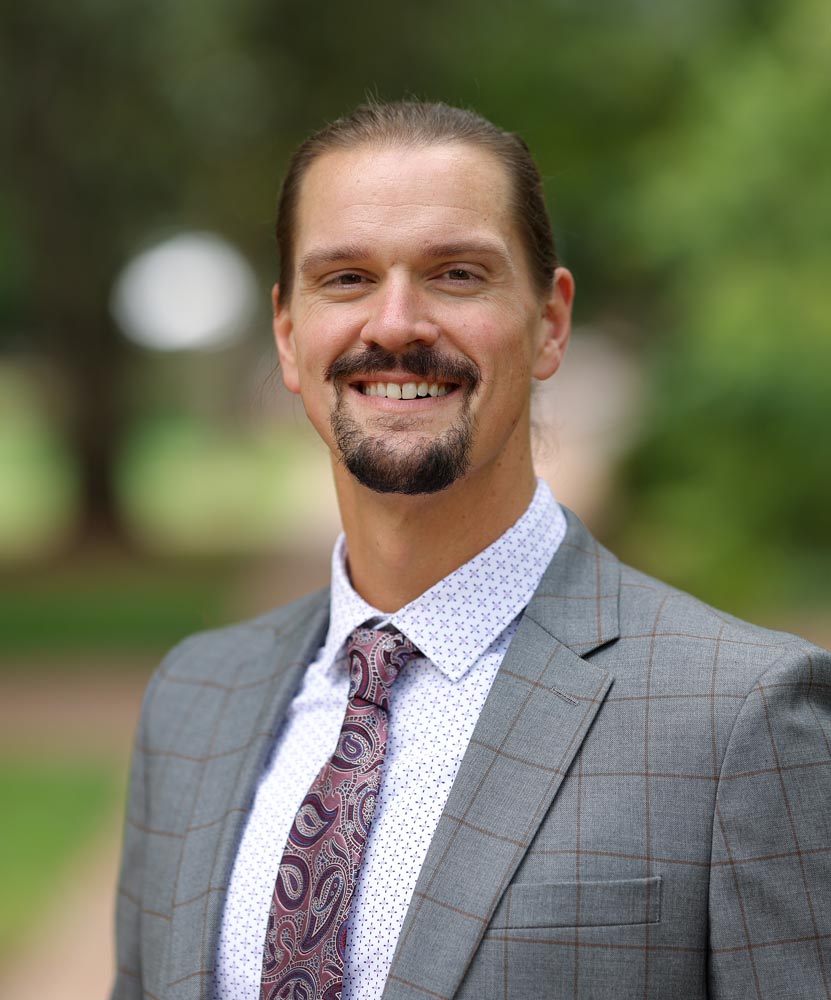
Benjamin Dobbs
Assistant Professor of Music Theory
- Email: benjamin.dobbs@furman.edu
- Phone: 864.294.2262
- Office: Daniel Music Building 107
Benjamin Dobbs is an active scholar, pedagogue, and performer. As a music theorist and music historian, his research interests center broadly on the development of music and musical thought during the Protestant Reformation in Middle and North Germany, and include analytical methods for sixteenth- and seventeenth-century repertoires, the emergence of harmonic theory and its integration with contrapuntal practice and composition pedagogy, and the impact of the Thirty Years’ War on European musical cultures. Benjamin’s research has been supported by grants from the Deutscher Akademischer Austauschdienst (German Academic Exchange Service), the American Friends of the Herzog August Bibliothek, and the Toulouse Graduate School. He has presented at conferences throughout the USA, Germany, Austria, and Canada, and has published articles and reviews in Musiktheorie, Renaissance Quarterly, Theoria, Harmonia, and the forthcoming Lexikon des Orchesters.
Benjamin's dissertation for his Ph.D. in Music Theory situated Heinrich Baryphonus and Heinrich Grimm’s music manual, Pleiades musicae (1615/1630), within philosophical, religious, cultural, and music theoretical contexts. While at UNT, he held doctoral, teaching, and dissertation fellowships, and won awards for teaching and research. Upon graduating he joined the faculty at UNT as Visiting Lecturer in Music Theory.
Benjamin sings in the Greenville Chorale and the choir at Episcopal Church of the Resurrection (Greenwood, SC), where he occasionally serves as cantor, conductor, and substitute organist.
Education
- Ph.D., University of North Texas
- M.M., University of North Texas
- B.A., University of Central Arkansas
Training Under:
- Graham Phipps, Frank Heidlberger, and Hendrik Schulze, University of North Texas
- Carl Anthony and Jane Dahlenburg, University of Central Arkansas
Philosophy
My approach to teaching is driven in equal parts by my aspiration to constantly learn more about the music and musical cultures of the past and present, and by my desire to plant the same investigative spark within the next generation of musicians and scholars. My responsibility as a member of the academy is threefold: (1) to preserve the current field of musical knowledge through study, (2) to increase the field of knowledge through research, and (3) to disseminate the field of knowledge through publications, presentations, performance, and teaching. In order to achieve these goals within the context of the classroom, my philosophy of pedagogy consists of three fundamental beliefs:
- Teaching and research mutually reinforce each other
- The integrated study of music history / music theory leads to an increased understanding of both
- One-on-one mentoring relationships are vital for discovering and fostering the strengths of each student
Through these principles, I seek to challenge my students to think critically about the music that they perform, teach, and study, and in doing so to cultivate a spirit of curious exploration and rigorous investigation.
Research Interests
Musical style and thought during the Protestant Reformation; Early-modern music theory; Analysis of 16th- and 17th-century music; Music theory pedagogy
Representative Publications
- Dobbs, Benjamin. 2021. “Bach, Johann Sebastian,” “Ensemblemusik, vor 1750,” “Hofkapelle,” “Mattheson, Johann,” “Pergolesi, Giovanni Battista,” “Praetorius, Michael,” “Rameau, Jean-Philippe,” “Schütz, Heinrich.” Lexikon des Orchester. Edited by Frank Heidlberger, Gesine Schröder, and Christoph Wünsch. Laaber, Germany: Laaber-Verlag.;
- Dobbs, Benjamin. 2017. “A Review of Klaus-Jürgen Sachs’s Musiklehre im Studium der Artes: Die Musica (Köln 1507) des Johannes Cochlaeus.” Renaissance Quarterly 52, no. 4: 1615-1617.;
- Dobbs, Benjamin. 2016. “Die Privilegierung der verschriftlichten Musik als Impuls für das Konzept der ‘musica poetica’: religiöse, intellektuelle und musikalische Faktoren im 16. Jahrhundert” (The Privileging of Written Music as Impetus for the Concept of ‘Musica poetica’: Religious, Intellectual, and Musical Factors in the Sixteenth Century). Musiktheorie 31, no. 1: 5-15.;
- Dobbs, Benjamin. 2013. “A Review of Peter Sjökvist’s The Music Theory of Harald Vallerius: Three Dissertations from 17th-century Sweden.” Theoria 20: 145-155.; Dobbs, Benjamin. 2012. “Tonal Trajectory in “De quan qu’on peut:” An Examination of Directed Progression and Modal Species in an Anonymous Ballade from the Ars subtilior.” Harmonia: The Journal of the Graduate Association of Musicologists und Theorists (GAMuT) at the University of North Texas 10: 37-57.
Honors and Awards
- 2021. Orpheus Award, Phi Mu Alpha Sinfonia. Gamma Eta Chapter, Furman University;
- 2018. Honorary Membership, Phi Mu Alpha Sinfonia. Gamma Eta Chapter, Furman University;
- 2013. First Place (Humanities Category), Graduate Research Exhibition, Toulouse School of Graduate Studies, University of North Texas. “An Illustrious Career Destroyed by War: Resurrecting the Music of Heinrich Grimm”;
- 2012 – 2013. Mattie Jo (Payne) Groom Graduate Theory Scholarship. College of Music, University of North Texas;
- 2011 – 2012. Outstanding Teaching Fellow in Music Theory. College of Music, University of North Texas
Additional Professional Activity
Recent Presentations
- 2022. “Reconstructing Early Modern Music Networks: Heinrich Baryphonus as Case Study." Annual Meeting. Society for Seventeenth Century Music. University of Delaware. Newark, DE; 2021. “The University of Helmstedt as a Hub for Early Modern Music Theory." Virtual Annual Meeting. Renaissance Society of America;
- 2020. “De septenario illo et sacro numero”: The Divine Septenarius in Baryphonus and Grimm’s Pleiades musicae.” Esoteric Music, Music Performance, & Music Research. Nazareth College. Rochester, NY; 2019. “Reading Networks: Werckmeister as Historian and Intermediary.” Annual Meeting. German Studies Association. Portland, OR;
- 2019. “‘Hiermit stimmet auch der Baryphonus überein’: Werckmeister’s Authorities in Correspondence.” Annual Meeting. Renaissance Society of America. Toronto, Canada;
- 2017, 2018. “Reevaluating Early Triadic Theory: From Event to Object.” Annual Meeting of the Renaissance Society of America. New Orleans, LA. Fall Meeting. AMS Southeast Chapter. University of North Carolina Wilmington. Wilmington, NC
Musicianship
- 2021 – Present. Herring Chamber Ensemble. Member: Bass I;
- 2017 – Present. Greenville (SC) Chorale. Member: Bass I;
- 2017 – Present. Choir, Episcopal Church of the Resurrection, Greenwood (SC). Member: Bass-Baritone, Cantor and Conductor as needed, Substitute Organist
0